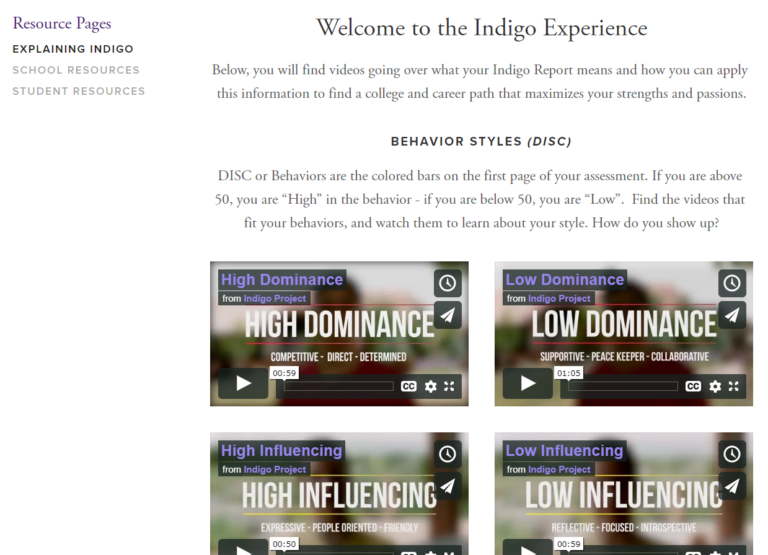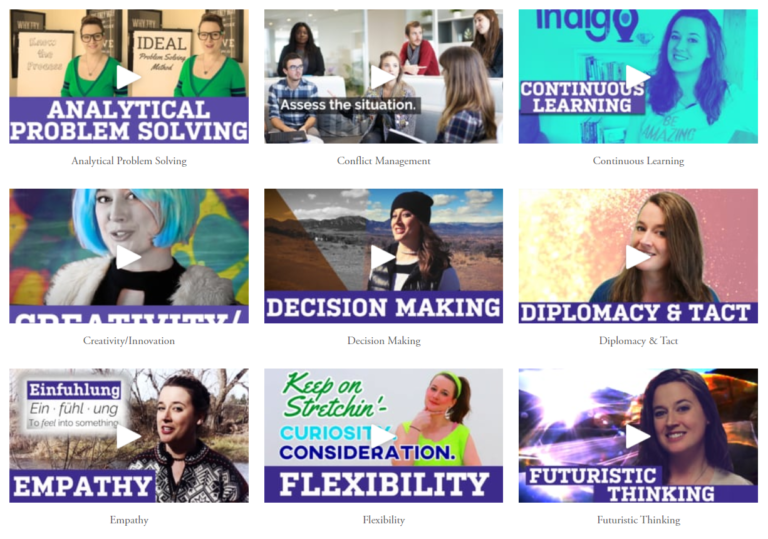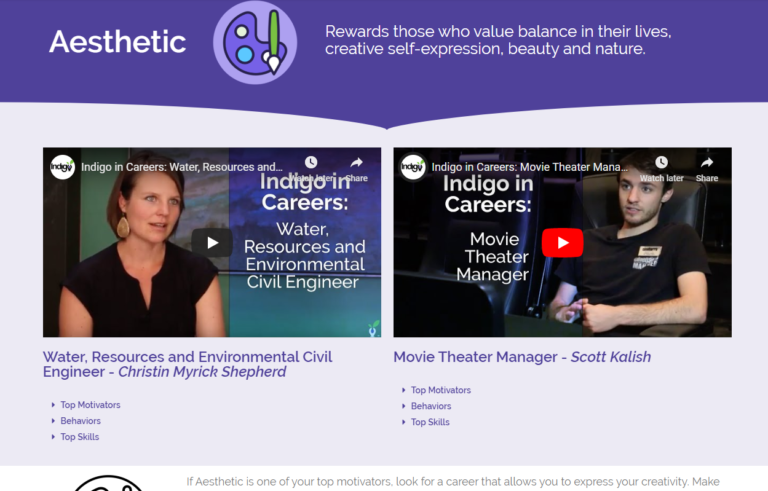Indigo for Schools
The Indigo Assessment
The Indigo Assessment is a science-based, multi-dimensional, comprehensive tool to help students and educators gain insights through self-awareness of their behaviors.
Assessment Types
IndigoMe
IndigoMe is the shortest version of Indigo Assessment offered. It evaluates DISC and Motivators and is typically given to staff and parents.
- DISC, Motivators
- 30 Minutes
- Staff, Parents
- 14 Page Report
IndigoMePlus
IndigoMePlus includes DISC, Motivators, and skills. It is typically given to staff and in organizations uncomfortable collecting Hartman/ACI data.
- DISC, Motivators, Skills
- 40 Minutes
- Staff, Students not taking ACI
- 16 Page Report (same report as Indigo)
Indigo
The full Indigo Assessment provides the most comprehensive picture, measuring DISC, Motivators, skills, and perceptions (Hartman/ACI).
- DISC, Motivators, Skills, Hartman/ACI
- 45 Minutes
- High school students, university students
- 16 Page Report
IndigoXL Variations
Indigo also offers a version of the DISC and Motivators section of the Indigo Assessment re-written at a 5th grade reading level. The XL version of the IndigoMe assessment, called IndigoXL, is the standard assessment for middle school students. It is also possible to create XL versions of the other assessments, but the skills and Hartman/ACI section will be the same as the standard assessment.
Things to Note
- Spanish language assessments and reports are available for IndigoMe, IndigoMePlus, and the full Indigo assessment.
- There is no report section produced for the ACI/Hartman section of the assessment. The data is available in the TTI IDS and the Indigo Dashboard to approved users.
- The assessment takes up to 1 hour depending on the version and students’ reading level. Specific timing estimates are included above.
- The assessment must be taken in one sitting. You cannot re-enter the assessment once it has been started.
- On the last page, select “Save.” Reports are emailed automatically. If a student does not receive a report, they should NOT retake the assessment. Instruct them to send an email to support@indigoproject.org with their full name and the name of the school and ask for the report to be resent.
Administering the Assessment
Indigo Education Company has a number of resources for proctoring the assessment in a group educational setting. Most schools Indigo works with use the website proctoring model, which is student guided. There are also teacher guided proctoring instructions for each assessment type. The assessment may also be embedded in the IndigoActivate course.
Website Proctoring Instructions
The website proctoring instructions guide students through taking the assessment. Each page includes a few sentences about the purpose of the assessment, a short video introduction, FAQs, and a link to ttisurvey.com. Website content and introductory videos are targeted to a particular age group.
The only thing a teacher/instructor needs to provide is the appropriate website link and the assessment code (e.g. 123456ABC).
Also available is a Spanish-language version of the instructions, which includes Spanish and English test, Spanish audio, and additional instructions for changing the assessment language.
Within an LMS Course
If students are taking one of Indigo’s courses, there is the option of taking the assessment within the course as the first module. The videos and text within the course parallel the high school website proctoring instructions linked above. Students will need the course login and the specific link code for their class.
Students Directly Purchase Assessments
Some universities choose to have students purchase assessments for themselves. If the assessment is purchased through a payment page set up by Indigo, the assessment link and password will be automatically sent once it has been purchased. Students will need a link to the purchase page (https://indigoeducationcompany.com/product/assessment/) and the coupon code that will provide a student discount and indicate which school their information should be sent to.
Teacher-Led Proctoring Instructions
Also available are teacher-led proctoring instructions for administering Indigo in a group setting. These documents guide a teacher through introducing Indigo, providing the assessment link, and a simple post-activity. The text is a combination of information for the teacher and scripts to read to the group. There are different versions based on the type of assessment.
A preview of what these instructions look like is available on the right. If you would like customized teacher-led proctoring instructions, please reach out to the person you work with at Indigo.
Individual Instructions
If you need to send instructions to a student, you can send them to the proctoring instructions website linked above with the relevant code. If you need to send instructions to a staff member, we suggest sending the link and the following text.
This survey takes up to 45 minutes, must be completed in one sitting and can be done from any internet connected device. Once you have saved/submitted all responses you will be redirected to an Indigo landing page. This is your indication that you are finished and your report will be in your inbox. If it isn’t please don’t retake the survey. Email support@indigoproject.org giving your name and organization and ask them to resend your report.
Report Pages
Expand the sections below for in-depth descriptions of each page in the Indigo Report. To see sample full size pages, download the Indigo assessment on the above right.
The Summary Page includes the DISC Graph, Motivator Graph, Top 5 Skills, Strengths, and Value to a Team. It acts as the cover page to the report.
You may also hear this page referred to as the Title Page, Top Page, Cover Page, or Page 1.
The IndigoMe and IndigoXL report does not include the Top 5 Skills section.
The Summary Page Explained page gives a brief overview of the material on the Summary Page and how to approach the information.
The About You page is a written description of the person.
It may also be referred to as About Me or The Mirror.
Your Natural and Adapted Behavioral Styles shows the natural and adapted DISC styles. It also gives some examples of people from fiction and real life with each DISC characteristic.
It may also be referred to as Natural and Adapted DISC or Adapted DISC.
The DISC Reference Guide gives insight into environment, communication, and job tips for each DISC trait. Many of the tips are applicable both in the classroom and the working world.
The What Motivates You page provides a graphical representation of the motivator scores in relation to the adult population average. It also has definitions of each motivator.
This page may also be referred to as motivator page or motivator graph.
The Motivator Reference guide includes things to do, activities to try, and major/career ideas that might appeal to each motivator.
The Your Skills page list the skills from top to bottom. The color in the right column indicates confidence in that skill.
This page will not be in the report for IndigoMe or IndigoXL, since those assessments do not include skills.
This page includes two sections Do’s: How Other People Should Communicate with You… and Don’ts: …And How Others Should Not Communicate with You.
It may also be called Do’s and Don’ts or Communication.
The Environment and Challenges page includes three sections: Things You May Want From Others, Your Ideal Work Environment, and Some Potential Challenges.
This page may also be called Environment, Wants, or Things you may want from others.
The next page also has three sections, Your Strengths, What Others May Value In You, and Potential Weaknesses With Your Style.
This page may be referred to as Strengths or Strengths & Weaknesses.
The Possible Degree Matches section is a 1 to 3 page section that lists degrees that may align with that person’s characteristics.
It may also be referred to as Majors, Jobs, Degrees, or Careers.
Likely Time Wasters is a 1 to 2 page section that lists top potential time wasters, possible causes of the time wasters, and possible solutions to address them.
Indigo Components Overview
Behaviors describe how we communicate, or “show up”, when we are around people. It explains our social habits and styles.
Each of the DISC scores falls somewhere between 0-100, and is indicated by a colored bar, with the numerical score listed underneath. There is no good or bad in DISC. The score just indicates which behaviors come more naturally to a person. If a student is Low (0-30) in a certain behavior, then they will favor the tendencies described in the Low category in most situations, just as the High (70 – 100) will favor the tendencies described in their categories. Students in the Middle (31 – 69) can go either way depending on the context.
There is no best combination. High performing teams and organizations have a mix of all styles because all styles can contribute their unique strengths. There is no wrong style, but it’s important to remember that there are wrong environments for every style.
Motivators are what drive us. Understanding someone’s motivators helps explain why they do the things they do.
The Motivator graph is on the first page of the report on the bottom left. The top blue (or black) line and the number to the right of the graph mark indicate a person’s score. The red bar below represents the middle 68 percent of the population. The thin white line in the middle of the red bar and number below it mark the corporate adult average score.
Focus on the top two motivators. These are typically the biggest driving forces behind the choices an individual makes. The lowest motivator may also be important for understanding what could disengage the student. It’s important to help students find activities and careers that align with their top two motivators so that they will be engaged and fulfilled.
The Indigo Report skills shows 23 skills that are important in the world of work. They are ranked in order of most developed to least developed compared to adult population norms.
Following strengths-based research, the key to success is utilizing your strengths while minimizing your weaknesses. People have greater potential in areas where they have natural talent. When looking at the skills list, think of those skills at the top as the ones that come more naturally to this student, thus requiring less energy.
Think of the skills at the bottom of the list as requiring more energy. There may be skills ranked low on the list that can be learned with more experience and training. The only reason a bottom skill is relevant is if it is hindering the student in some way.
Indigo’s social emotional scores, or “Perceptions”, measure how students perceive both their internal and external world at this moment in time. High scores are not necessarily “better” than low scores, and vice versa. While Indigo provides insights into each person’s unique values, behaviors, feelings, and perceptions, Indigo never attempts to make value judgments about those observations.
Perceptions scores are only available in the Indigo Dashboard to users who have been given specific permission to view them.
There are six Perceptions, three internal and three external. In general, scores are to be read as follows:
- Scores from 0-4 are considered “low clarity” scores.
- Scores from 4.1-6 are considered “moderate clarity” scores.
- Scores from 6.1-8 are considered “typical clarity” scores.
- Scores above 8 are considered “high clarity” scores.
There will also be a +, – or O next to the score. This describes how a student feels about him- or herself and the world around them. + is a positive bias, – a negative and O is neutral. Think of bias as a feeling or an over/under emphasis in that dimension.
For more information, see the Indigo Fieldbook.
Requesting an Assessment Link
The primary Indigo contact at your school/organization will be issued a google form to request links after your initial conversations with Indigo. When requesting an assessment link, you will need to provide the following information:
- Type of Report
- Who will be taking the assessment
- Expiration date or assessment # limit
- Demographics (Middle School, High School, University, Adult)
The Indigo Dashboard
The Indigo Dashboard is a customized online database for teachers, counselors and school administration to have access to all of their student’s Indigo reports. The dashboard incorporates highlights, an “At-A-Glance” interpretation of each individual report including unique attributes, recommendations and questions to ask students to learn more about them.
You should receive an invite to your dashboard when you signed up with Indigo. You can invite users from the organization to this dashboard with varying levels of access. Please do not share or show externally due to FERPA policies. Reports are updated several times a day and there is a manual update button in the data table of each dashboard.
Tiles
The Indigo Dashboard is navigated by tiles, each with a specific purpose. See an overview of each tile in this section, or view dashboard tutorials in the section below.

Find Someone
Use the Find Someone tile to search by name and pull up an individual’s data.
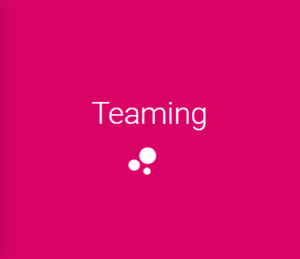
Teaming
Use the Teaming tile to create teams that are Harmonious, High Performing, Similar DISC, or Similar Motivators.
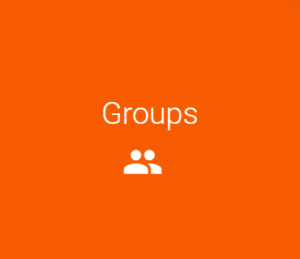
Groups
View and create rosters for classes, grades, and clubs in the Groups tile, then view groups in the Data Table.
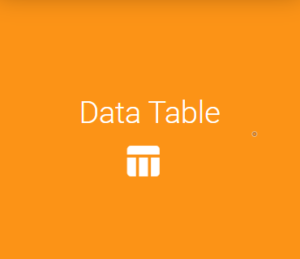
Data Table
The Data Table displays DISC, Motivators, and Skills data. Use the Filter Menu to narrow down results.
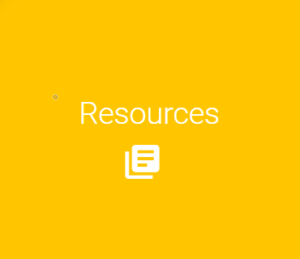
Resources
Access Indigo resources using the Resources tile, including tutorials, Indigo books, and activities.

Ask an Expert
Communicate with Indigo staff directly through the dashboard by using the form in the Ask an Expert tile.

Lists
Use the Lists tile to view lists of students with specific characteristics like Entrepreneurs or Empaths.
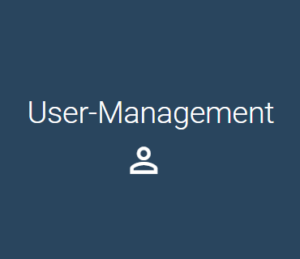
User Management
The User Management tile allows staff to add and manage users and permissions.
Dashboard Tutorials
Courses
Indigo Education Company currently offers three courses in two formats.
View all courses by going to the website based course navigation page: https://indigoeducationcompany.com/course-navigation
IndigoBasics for Students
IndigoBasics is designed to be a guide through the initial steps on the journey to self-awareness. Students explore their Indigo Assessment results to interpret their behaviors, motivators, and soft skills and apply them to their lives.
IndigoBasics is ideal for: Students who are new to Indigo. Students can take the Indigo Assessment as part of the course or separately.
Indigo Career Exploration
Indigo Career Exploration is an extension of the Basics course where students apply their understanding of themselves and their Indigo results to finding a fulfilling career. During this course, students will create a Master Activation Plan, or MAP, which is a website with information about who they are, what’s important for them, and what careers interest them.
Indigo Career Exploration is ideal for: Students who have taken the IndigoBasics course. Students who have attended Indigo workshops in class.
Indigo Career Plus
Indigo Career Plus is a combination of the IndigoBasics and Indigo Career Exploration courses. Students are introduced to Indigo and apply their knowledge to career exploration in each step.
Indigo Career Plus is ideal for: Students who are new to Indigo and interested in career exploration.
Moodle LMS vs. Website Course
Students can take the course as a Moodle course or on Indigo’s website. Both formats contain the same content and outputs.
Moodle LMS Course
- Track student progress
- Automatically graded activities
- Requires registration
- Career Plus/Exploration: student URLs visible in Dashboard
How to start: Speak to your contact at Indigo about setting up a cohort code for your students to take the course
Website Course
- Quick access – just go to the website link
- No registration, no progress tracking
How to start: Send students to https://indigoeducationcompany.com/course-navigation and let them know which course you want them to take
Course Tutorials and Additional Material
Resources
Indigo has been working for nine years in secondary schools and universities and has developed a lot of resources along the way. Feel free to use these for your school and let us know your resource requests.
Help Desk. Responses to frequently asked questions. Or contact Indigo directly by emailing support@indigoproject.org.
Materials
All materials are copyright Indigo Education Company unless otherwise specified and may be used for educational purposes only. Resale is not permitted.
Indigo Activity Library. Access over 60 activities including Most Popular, College & Career, Skills, and SEL.
DISC Reference Guide. Download a copy of the DISC Reference Guide, which is also included in the report.
Motivator Reference Guide. Download a copy of the Motivator Reference Guide, which is also included in the report.
Assessment Vocabulary. Download a vocabulary guide for the assessment questions. This vocabulary is for the standard Indigo Assessment questions, it does not apply to the IndigoXL questions.
Things You Can Do with Indigo. Download a list of ideas for using Indigo in different classes. This resources may also be found in the Indigo Fieldbook for High Schools.
3-Year Implementation Guide. Download a sample 3-year whole school implementation schedule.
Other Materials. Indigo has extensive materials for implementation and expansion. If you need a particular type of material, contact Indigo with the details.
Indigo Books
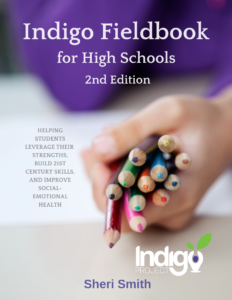
Indigo Fieldbook for High Schools
This 220 page full-color book has detailed information about the Indigo philosophy and assessment components and how to incorporate a student-responsive and college-going culture into a school. It includes over 80 lesson plans for SEL support, 21st century skills building, and college and career readiness.
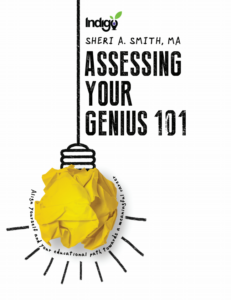
Assessing Your Genius 101
This 150 page book is designed for students who want to explore their Indigo reports in depth and learn about how they can apply their innate strengths toward choosing a fulfilling career. The workbook includes exercises embedded in the content and additional activities with a focus on college major and career exploration.
Certification
IndigoBasics Certification is a 3 workshop series where you build the foundations to become a subject matter expert on the Indigo Indicators and Platforms, and earn your IndigoBasics Certificate. Each workshop is 90 minutes and will be recorded if you are unable to attend part or all of any session.
Video Resources
The Explaining Indigo page includes videos about all of the different DISC styles and Motivators, and an overview of skills and strengths.
Click on the image on the left to go to the Explaining Indigo page.
The skills videos page has videos for each of the 23 skills on the Indigo Assessment. Each video has the skill definition, a description, and tips for developing the skill. There is also a guide to the skills with their definitions which can be downloaded.
There are also videos about the 80/20 Principal and combining different attributes for a full picture of oneself.
Click on the image on the left to go to the Skills Videos page.
The career videos page has short videos interviews with professionals who have careers that are aligned with their top motivators.
Click on the image on the left to go to the Career Videos page.
Privacy Policy
Questions?
Contact support@indigoproject.org

